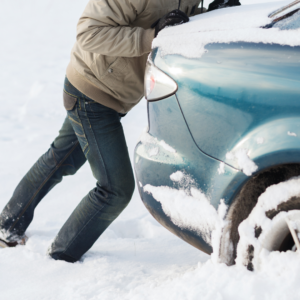Shocks-struts wear with time and miles, and will require replacement as it wears or gets stressed. Let us help you know what role shocks- struts have with your car, why they are important and when to replace them.
Here at Honest Accurate Auto Service, we recently had a Toyota Highlander in the shop that had a broken strut, probably from hitting a pothole some time ago. The customer said that they had been hearing a “clunk”, and then it became suddenly much worse and the car was not safe to drive. What happened was that the broken strut eventually wore through the strut mount, causing it to break… and making the “clunk” sounds.
Lesson learned: pay attention to noises in your car. If allowed to progress, greater damage can occur! If broken shocks-struts are not repaired in a timely manner, they can also wear out the wheel bearings and/or cause tire “cupping” (uneven tire wear). This would result in higher repair costs.
Manufacturer’s generally recommend replacement of shocks- struts at  around 50,000 miles. However, on this vehicle we noted significant leaking of oil around the strut. Be aware that shocks and struts don’t just go “bad” one day, but lose their effectiveness over time and accumulation of miles. Since this change happens rather slowly, you may or may not notice the change. Shocks and struts will wear more quickly depending on where and how you drive (for example, if you often drive on gravel or bumpy roads).
around 50,000 miles. However, on this vehicle we noted significant leaking of oil around the strut. Be aware that shocks and struts don’t just go “bad” one day, but lose their effectiveness over time and accumulation of miles. Since this change happens rather slowly, you may or may not notice the change. Shocks and struts will wear more quickly depending on where and how you drive (for example, if you often drive on gravel or bumpy roads).
 around 50,000 miles. However, on this vehicle we noted significant leaking of oil around the strut. Be aware that shocks and struts don’t just go “bad” one day, but lose their effectiveness over time and accumulation of miles. Since this change happens rather slowly, you may or may not notice the change. Shocks and struts will wear more quickly depending on where and how you drive (for example, if you often drive on gravel or bumpy roads).
around 50,000 miles. However, on this vehicle we noted significant leaking of oil around the strut. Be aware that shocks and struts don’t just go “bad” one day, but lose their effectiveness over time and accumulation of miles. Since this change happens rather slowly, you may or may not notice the change. Shocks and struts will wear more quickly depending on where and how you drive (for example, if you often drive on gravel or bumpy roads). What is the purpose of struts and shocks? Struts are an integral part of the suspension system, actually bearing the weight of the car. Therefore, the front shocks/struts have greater load bearing carrying the weight of the engine. Shocks absorb the bumps in the road, helping the car find its equilibrium quickly after you hit a bump to stop the bouncing.
Things to look and listen for if your shocks- struts need replacement:
- Bumps and potholes feel “sharper” (ie. your coffee spills when you hit bumps!)
- Your teeth chatter as you go down a gravel road
- Upon braking, the front end seems to “nose dive” and drop into the stop (poor braking)
- Your vehicle sways on corners, as body control decreases. If you need to swerve quickly to miss another vehicle or obstacle, your vehicle will hesitate and not follow the turn.
- Suspension feels “bouncy” or “sponging” going over dips in the road
- “Clunking” noise over bumps or with turning. This generally happens when the shocks/struts are failing badly.
- Uneven tire wear
When our ASE Technicians put your car up on the lift and examine the shocks- struts, we look for damage on the shock or strut, or tears in the protective “boot”. The boot is a rubber piece that protects the shock from dust and dirt. When it tears or disintegrates, the dirt that gets in will make the shocks wear more quickly. Since these components are filled with oil, another thing we check for is leaking. You probably would not notice leaking, because they usually do not drip onto the ground, but instead, coat the entire assembly and will collect dirt and grime.
Once a shock is leaking, the performance will diminish rapidly. Further damage could occur (& be more expensive) if a shock or strut is not replaced when leaking or damaged.
Shocks-struts are replaced in pairs (both sides of front or rear axle) in order to keep an even stress. It is highly recommended to do an alignment after replacement to ensure everything will drive nice and straight.
Vehicle maintenance, like replacing shocks-struts, help keep your vehicle running smoothly, with fewer “surprise” repairs. We strive to keep you informed, but not pressured, regarding needed or upcoming maintenance for your vehicle to keep you driving safely and reliably.




